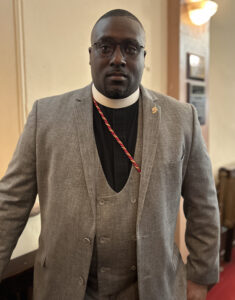Is it possible to get the best of both worlds when it comes to earning a college degree? For students who choose the hybrid learning model at Lancaster Bible College | Capital Seminary & Graduate School, the answer is yes!
LBC | Capital currently offers the hybrid modality at both its Washington, D.C., and Philadelphia locations. This style of learning blends in-person interaction with the flexibility of some online work that is completed independently without the requirement be on campus or at one of the college’s off-campus sites.
For those who appreciate interacting with their professors and classmates face-to-face, students receive faculty-led instruction in a combination of in-person and online learning using LBC | Capital’s learning management system called Canvas. Each week, hybrid students spend two hours in class for each evening course they take, then complete the rest of their work online when it suits their schedule, although assignment due dates must still be met.
There are many benefits to participating in an LBC | Capital hybrid course, such as in-person professor-student interaction, smaller class sizes and a strong spiritual community—all with the flexibility students need. Hybrid learning also gives students the opportunity to connect with diverse classmates and faculty from all walks of life who draw from different life experiences, socioeconomic statuses, religious experiences and varied generations.
 Dr. Tanya Solomon, Site Director at LBC | Capital – Philadelphia, where students enroll in hybrid courses, says this modality is appealing for adult students especially due to the opportunity to build personal relationships.
Dr. Tanya Solomon, Site Director at LBC | Capital – Philadelphia, where students enroll in hybrid courses, says this modality is appealing for adult students especially due to the opportunity to build personal relationships.
“The relationships that students develop with faculty, staff and other students are the secret sauce of hybrid learning sites,” Solomon said. “These relationships provide academic, spiritual and interpersonal support to students who are juggling many responsibilities as they take on the academic rigors of college. These connections also allow students a safe space to be vulnerable and to grow. Because of the relationships formed, students at our hybrid sites experience prayerful affirmation, edification and community in a way that cannot be duplicated virtually. They essentially become a part of an extended family.”
Additionally, hybrid courses, which are also offered at LBC | Capital’s site in Washington, D.C., empower students who pursuing their life’s calling to enroll in courses that meet their educational goals. Likewise, hybrid learning can help support students who lead busy lives—raising a family, working full time, participating in ministry and serving their community.

John Connor (’23 & ’26) graduated with a bachelor’s degree in Biblical Studies after taking hybrid courses at LBC | Capital – Philadelphia and is now enrolled in the college’s fully online Master of Divinity program.
John Connor (’23 & ’26), who graduated with a bachelor’s degree in Biblical Studies after taking hybrid courses at LBC | Capital – Philadelphia, is now enrolled in the college’s fully online Master of Divinity program. Alongside his graduate work, Connor leads workshops and teaches Bible study classes at his church in an effort to help guide fellow believers in their exploration of Scripture and apply its principles to their lives, while simultaneously serving as Adjutant General under Abundant Harvest Ministries Worldwide Inc.
“In addition to teaching at my church,” he added, “I have been allowed to preach frequently at various ministries. Through these engagements, I have been able to spread the Word of the Lord and share His message with different congregations. It is a humbling experience to be able to inspire others through God’s teachings and witness their spiritual transformation.”
Connor said he appreciated LBC | Capital’s hybrid learning model because of the flexibility and convenience it provided.
“With the hybrid learning model, I had the option to attend classes both in person and online,” he said. “This allowed me to choose the mode of learning that suited my needs best. I could still get involved and interact in the course through online platforms on times when I couldn’t physically attend on campus due to personal obligations, employment, ministry or other reasons. This adaptability aided me in maintaining a healthy work-life balance.”
Just as crucial, he added, the hybrid-learning paradigm helps students become deeply engaged in their educational experiences.
“In-person classes (enable) students and teachers to converse face-to-face, allowing for immediate discussion and debates,” Connor said. “These conversations improved my comprehension of the subject and allowed for deeper study. Online components, such as discussion forums and virtual group projects, on the other hand, fostered teamwork and critical thinking abilities.”
Many hybrid students attest to the benefit of sitting under the instruction of professors who are content experts and actively work in the field. Students are able to develop relationships with faculty who make the learning process less tedious because of their ability to relate with students.

By 2025, Millicent Murray will have earned three degrees from LBC | Capital.
Millicent Murray (’21, ’23 & ’25) has experienced hybrid learning at LBC at the undergraduate as well as the graduate level. After earning both an associate and bachelor’s degree in Biblical Studies, Murray is now working toward her Master of Arts in Ministry degree.
“I appreciated the hybrid learning model for my bachelor’s degree as it gave me the best of both worlds,” she shared. “I could study from home but could also meet with professors and fellow classmates in person. Zoom is fine, but it prohibits interaction with like-minded people who are pursuing an education that will grow and mature them into who God has designed them to be. Being able to study in the comfort of my home yet meet with my classmates for hybrid learning has been a real blessing to me. I am glad that I have chosen to continue this type of learning for the master’s program I am currently pursuing.”
Those enrolled in hybrid courses at LBC | Capital are also able to participate and become involved at the college’s urban sites through student-led activities and Student Council. And to support their learning journey, students can utilize the academic support found through the Ally Center, including face-to-face meetings, tutoring and help with technology as they also have access to the Charles & Gloria Jones Library at LBC Library as well as computer labs.
One of the most important benefits of hybrid learning is the advantage of adult students being able to complete their coursework while simultaneously raising families, working and serving.
“We communicate to students the need to count the cost and communicate with their loved ones, friends and co-workers their choice to return to school,” Solomon said of the commitment of working toward a college degree. “This means that it may require some sacrifice for the season that they attend in person. Over time, many students develop time management and study skills that make them better able to work and serve in their personal lives.
“For example,” Solomon continued, “most are engaged in ministry at their churches and are already doing amazing things before their matriculation at LBC. We find that as they learn new concepts and ideas in classes, they apply them in their work, ministry and family lives. As another example, I have heard repeatedly that some model for their families and communities what it means to be a good student by sharing ‘study time’ with their children and grandchildren. They even have healthy competition for grades with them.”
Especially at this stage of life, obtaining a college degree becomes a family affair for many students—and the hybrid learning model equips them for success that is eventually realized on graduation day.